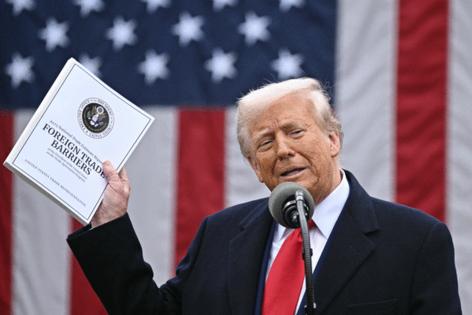Economists say Trump's tariffs boost uncertainty, recession odds
Published in News & Features
President Donald Trump’s big tariff rollout was supposed to reduce uncertainty for businesses. Economists say it did the exact opposite, while also raising recession risk.
Some 76% of the 54 forecasters who responded to a Bloomberg survey conducted April 2-3 after the announcement said the imposition of sweeping levies only adds to the uncertainty about trade policy for business decision-making. Some 92% said it raises the risk of a U.S. economic downturn over the next 12 months.
The results square with revisions to projections that several Wall Street firms published late Wednesday and Thursday, following Trump’s Rose Garden event. Many warned of a recession — and inflation returning to pandemic levels — with some saying it’s now their base case.
“There is still substantial uncertainty of what the eventual import tariff rates will be and how long they will remain in place,” said Kathy Bostjancic, chief economist at Nationwide Mutual Insurance Co. “For now, we assume that negotiations with trading partners will lead to lower ‘reciprocal’ rates than announced, but the minimum 10% universal portion could largely stick.”
Trump’s move to impose major tariffs on trading partners around the world rocked financial markets Thursday. The U.S. president argues the adjustments are necessary to rebalance the global economy following decades of growing imbalances that have disadvantaged American workers.
Survey respondents overwhelmingly agreed they would need to revise their forecasts for U.S. growth lower and inflation higher following the announcement.
At the same time, 58% said the levies increased the likelihood that trading partners would make a greater effort to reach an agreement with the U.S. sometime this year that removes most, if not all of, the tariffs.
_____
©2025 Bloomberg L.P. Visit bloomberg.com. Distributed by Tribune Content Agency, LLC.







Comments